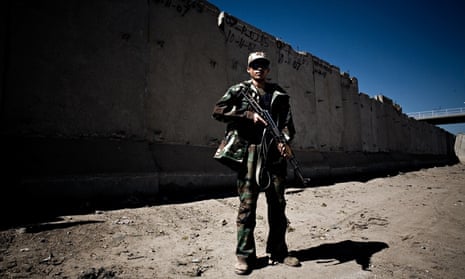Shia militias acting under Iraqi government cover are leading the persecution of lesbian, gay, bisexual and transgender (LGBT) Iraqis, sharply increasing their risk of death or exile, a report has found.
The role of the militias has added a new layer of danger to the country’s vulnerable LGBT community, which was among the least protected groups in Iraqi society, the International Gay and Lesbian Human Rights Commission and the women’s human rights group, Madre said on Wednesday.
LGBT Iraqis lack family or community support and the government refuses to offer any meaningful protection, according to the report When Coming Out Is A Death Sentence published by the group. It said the central government was likely to be complicit in a recent increase in attacks against gay people in Baghdad, which have been carried out by the feared Shia militia, Asa’ib Ahl al-Haq.
“Past and present killing sprees against LGBT Iraqis have taken place with total impunity,” it said. “No one has been held accountable for the murders, and the previous government rejected calls to even investigate violence based on actual or perceived sexual and gender non-conformity.”
On 15 May this year, Asa’ib Ahl al-Haq – the most powerful Iranian backed militia group in Iraq – displayed wanted posters in Baghdad of 23 men it said were gay and another man accused of having long hair. One month later, two allegedly gay youths, aged between 15 and 17, were attacked and beheaded with their heads thrown in a rubbish bin, said a witness to the attack. A subsequent attack on a Baghdad brothel, thought to have been carried out by the same militia, killed about 34 people, most of them women.
Gay and lesbian people have long been treated as sexual deviants in Iraq and are rarely offered protection from the immediate family, clan or tribal structures. So-called honour killings of gay or transgender family members have frequently been carried out, with perpetrators remaining unpunished.
Members of the community have told the Guardian they have no option but to live in complete secrecy and run a high risk of being betrayed to people who would likely harm them.
Some international groups have helped relocate vulnerable individuals outside the country. However, crumbling security and a sharp rise in the numbers of internally displaced people since the Islamic State (Isis) terror group launched an insurgency in June has added another dimension of risk – with fresh hostility being experienced among refugee populations.
At least 1.8 million Iraqis are internally displaced, with many having fled to Kurdistan.
The report says that Kurdish attitudes to LBGT issues are marginally better than in Baghdad. Attitudes towards LBGT communities are similar in the countries surrounding Iraq, making an escape across borders a dangerous proposition. Most community members who have made it out of Iraq have sought refuge in Europe or the US.
The report recommends an LBGT liaison be established at all embassies in Baghdad and for resources to be established in the more secure Kurdish north to protect members of the community who have fled.
It also urges that asylum applications from members of the community be expedited and that NGOs be authorised to provide shelters for displaced victims fleeing violence.
